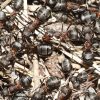Play Video
4:32
Coronavirus variants: what you need to know – video explainer
Sign up for the Guardian Today US newsletter
As researchers around the world scramble to understand the dangers of several newly discovered variants of the deadly coronavirus, the US remains woefully behind in its ability to track the mutations, scientists say.
The federal government has had its “head in the sand”, failing to develop a coordinated surveillance system for tracking the genetic footprints of the virus, according to academic researchers, scientific panelists and private entrepreneurs, who say they have been urging US officials for months to make better use of the hi-tech resources already sitting in labs around the country.
Genomic sequencing looks at the entire genetic code – or genome – of viruses obtained from samples from infected patients. The technique allows researchers to watch for dangerous mutations and to track movements of specific variants, like detectives following footprints.
Most genetic variations are inconsequential. But to discover those with functional differences, like more transmissible variants first identified in the UK (B117) and in South Africa (B1351), the research is essential. Yet by Friday the US had only plotted and shared the genetic sequences of 0.3% of its coronavirus cases, ranking 30th in the world, behind countries including Portugal, Latvia and Sierra Leone, according to a tracker developed by scientists at the Broad Institute of MIT and Harvard. Some US states have had virtually no surveillance at all.
‘That hurricane is coming’: expert warns US to brace for virulent Covid strain
Read more
“We’re used to being No 1 and this technology is all over the country,” said Jeremy Kamil, a virologist at the Louisiana State University Health Sciences Center Shreveport, who heads a coronavirus sequencing effort there. Instead, he said, when alarms were raised about the new mutation spreading rapidly in the UK, “we were in the dark. With so few samples, the detective work becomes more like seeing a mirage in the desert.”
‘A failure of leadership’
As viruses replicate, small copying errors lead to changes in their genetic material. These mutations are one of the central features of how viruses function, mutating as they infect more and more hosts. Following the different changes can be like tracking fingerprints or footprints for homicide detectives. By watching for a sudden increase in a certain version of the virus, researchers can raise an alarm if one particular variant appears to be more transmissible than the dominant strain, as happened in December with the variant discovered in the United Kingdom, known as B117.
The UK has been a world leader in the field of genomic sequencing, budgeting £20m ($27m) at the beginning of the pandemic to fund and coordinate research by a large network of laboratories around the country. So far, it has examined 186,000 genetic samples of its coronavirus cases – more than twice as many as the US, despite a caseload that’s one-seventh the size of that of the US, according to data from the worldwide open repository of genetic information, known as Gisaid.
The US offered its scientists no such budget and coordination.
In December, as scientists around the world scrambled to understand the potential dangers of the new variant rapidly spreading around London, the US had no way of knowing whether it was also thriving there, as many states had done no genetic sampling at all.
The US also severely lagged behind when it came to sharing the few sequencing results it had with the global network of scientists tracking the pandemic through a global repository of genomic data. It has taken the US a median of 72 days to process and share each genetic sequence, compared with 23 days for the UK researchers, according to figures compiled by the Broad Institute with data from Gisaid.
“It’s just been a head-in-the-sand approach,” said Dr Diane Griffin, a virologist at the Johns Hopkins University School of Public Health. “It was really a failure of leadership.”
Griffin chaired a national panel of scientists that warned the federal government in a National Academies of Science report last summer that the US genomic research response to the virus was “patchy, typically passive, and reactive” due to “poor funding, coordination and capacity”.
Yet, she said, the government “never did anything”.
The Trump administration’s attitude towards testing and tracking mutations of the coronavirus seemed to be reflected by Donald Trump’s remarks in May that “if we didn’t do any testing, we would have very few cases”.
The Centers for Disease Control and Prevention finally began to ramp up genetic surveillance of the virus in mid-December, after alarms were raised about the UK variant, and contracted with several private testing companies to check at least some genetic samples from every state.
Contributing to the chaos was the US’s lack of the type of centralized healthcare model that allowed the UK to streamline its genetic research. “We’ve yoked testing to insurance reimbursement,” said Dr Alex Greninger, the assistant director of the clinical virology laboratories at the University of Washington’s medical center. But, while it is crucial to public health, “genetic sequencing does not help the individual patient”, making it hard to figure out who should pay for it.
Dr Phil Febbo, the chief medical officer of Illumina, an American company that makes some of the machines used to do the sequencing, said he had been urging US officials to develop a coordinated approach to tracking the virus since the beginning of the pandemic – only to be politely ignored.
His company finally started getting calls for help from federal officials around 18 December and now is working to scale up a laboratory that can sequence 3,000 samples a week, under a federal contract.
“I try not to take it personally, but I spent six to eight months being less effective trying to get people motivated to do genetic surveillance than a small virus variant [in the UK] was in a few weeks,” he said.
The CDC did not respond to a request for comment.
‘Running a marathon at a sprint pace’
Researchers at many of the academic research centers that have worked on their own to keep track of the genetic changes in the virus for months said they were still looking for federal leadership and funding, and hoping that the new administration would offer more of it.
‘Vaccine tourism’: tens of thousands of Americans cross state lines for injections
Read more
“We don’t need the Manhattan Project,” said Dr David Relman, a microbiology professor at Stanford University’s medical school, who also sat on the national panel. “Even if we can’t do a perfect job, let’s just do an OK job so we have some information. We can’t keep playing catch-up.”
The Biden administration’s “American Rescue Plan” for addressing the pandemic says the discoveries of the UK and South African variants “highlight a key vulnerability in our nation’s Covid response”.
Scientists believe the new variant discovered in the UK spreads about 50% more easily than the coronavirus variants currently dominant in the US. Researchers have already discovered at least one vaccine under development is less effective against the variant first discovered in South Africa (B1351.) That variant was found this week in two samples from South Carolina, but it remains unclear how prevalent it might be in the US.
“We simply do not have the kind of robust surveillance capabilities that we need to track outbreaks and mutations,” says the Biden administration’s rescue plan, which promises to dramatically increase funding. “Tracking the way the virus is changing and moving through the population is essential to understanding outbreaks, generating treatments and vaccines, and controlling the pandemic.”
Researchers at the University of Washington’s school of medicine said their understaffed labs were now squeezing in the time to do statewide surveillance on top of their other duties. They obtain their samples from leftover genetic materials from the other coronavirus testing work they do.
“A lot of us are stretched really thin,” said Pavitra Roychoudhury, an acting instructor of laboratory medicine at the university, who runs a virology lab that was involved in some of the earliest genetic sleuthing on the virus. She said she wakes up at 4am and often works until 11 at night, hoping she can somehow make a difference in fighting the pandemic. “I feel we’ve been running a marathon at a sprint pace,” she said.
Her supervisor, Dr Alex Greninger, said getting funding to do the surveillance still comes down to “which billionaire do you know?”
Philanthropies run by wealthy tech entrepreneurs have indeed provided much of the money to keep an eye out for dangerous changes in the virus.
California has organized a network of public health agencies, university researchers and laboratories, funded in part by the Chan Zuckerberg Biohub to do surveillance of coronavirus genomes spreading in the state. The Biohub, a non-profit research center, founded by the Facebook CEO, Mark Zuckerberg, and his wife, the pediatrician Priscilla Chan, offered no cost genetic sequencing for all California counties. But it had to negotiate a thicket of regulatory hurdles before it could get that started, according to Patrick Ayscue, an epidemiologist who is the senior biosecurity fellow for the center.
The center and the academic laboratories associated with the project had the equipment and expertise to do the genetic testing, but they didn’t have the samples of the virus from the infected patients. County health departments had the samples, but weren’t allowed to share them under privacy rules. The Biohub has had to negotiate more than 20 separate contracts with individual counties to get the work going with anonymized testing of the virus samples, Ayscue said. But many of California’s other counties still have no way of tracking the genetic variants of coronavirus flowing through their communities.
Ayscue said he hopes the Biden administration will coordinate a centralized federal system for genetic surveillance to make sure a balanced sample of cases from around the country are examined on a regular basis.
“A lot of things are going to get done now that weren’t in place previously,” said Ayscue. “But many of those things are so obvious that they could have been put in place nine or 10 months ago and things would be very different right now.”

























































Свежие комментарии